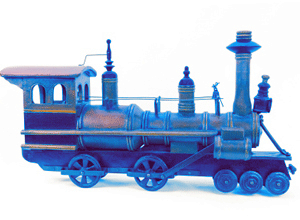
Four-year-old Johnny was in bed, but he wasn’t ready for sleep—not until Daddy came to read him a story. His eyes brightened when he saw the red book in Daddy’s hands, his favorite, the one about the little engine that could.
All the capable engines were broken down, worn out, or unwilling—except for one little engine who agreed to try. The good little boys and girls on the other side of the mountain would be without toys and food unless she could pull the rail cars. Hitched up, she said repeatedly, “I think I can.”
The climb was so strenuous, she could easily have quit, saying it was no use. But no, she kept saying, “I think I can,” and inched her way upward.
At the part where the train cleared the summit, Johnny clapped with glee and recited the last lines, “I thought I could,” a half-dozen times in a tone that sounded like a train clattering down the track.
“Sweet dreams,” Daddy said as he left the room.
The next morning, Johnny got dressed and put on his gray-and-white-striped train engineer’s hat. “I think I can. I think I can,” he said, imagining himself climbing a mountain. He would never quit trying, and one day he would make it to the top.
No writer has been successful by saying, “I can’t.” As soon as we believe that, we quit. We need to keep saying, “I think I can,” striving to improve, straining to inch our way upward.
As writers seek to please God, all things are possible. Faith is the power that will keep us trying and will carry our engine to the top.
As writers seek to please God, all things are possible. Faith is the power that will keep us trying and will carry our engine to the top.



